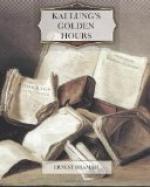“In that case, venerated and commanding sire,” replied Fa Fei simply, yet concealing her real regard behind the retiring mask of a modest indifference, “it shall be Hien, because his complexion goes the more prettily with my favourite heliotrope silk.”
When the results of the examination were announced it was at once assumed by those with whom he had trafficked that Tsin Lung had been guilty of the most degraded treachery. Understanding the dangers of his position, that person decided upon an immediate flight. Disguised as a wild-beast tamer, and leading several apparently ferocious creatures by a cord, he succeeded in making his way undetected through the crowds of competitors watching his house, and hastily collecting his wealth together he set out towards the coast. But the evil spirits which had hitherto protected him now withdrew their aid. In the wildest passes of the Chunlings Hien’s band was celebrating his unexpected success by a costly display of fireworks, varied with music and dancing. . . . So heavily did they tax him that when he reached his destination he was only able to purchase a small and dilapidated junk and to enlist the services of three thoroughly incompetent mercenaries. The vessels which he endeavoured to pursue stealthily in the hope of restoring his fortunes frequently sailed towards him under the impression that he was sinking and trying to attract their benevolent assistance. When his real intention was at length understood both he and his crew were invariably beaten about the head with clubs, so that although he persevered until the three hired assassins rebelled, he never succeeded in committing a single act of piracy. Afterwards he gained a precarious livelihood by entering into conversation with strangers, and still later he stood upon a board and dived for small coins which the charitable threw into the water. In this pursuit he was one day overtaken by a voracious sea-monster and perished miserably.
The large-meaning but never fully-accomplishing Emperor
K’ong reigned for yet another year, when he
was deposed by the powerful League of the Three Brothers.
To the end of his life he steadfastly persisted that
the rebellion was insidiously fanned, if not actually
carried out, by a secret confederacy of all the verse-makers
of the Empire, who were distrustful of his superior
powers. He spent the years of his exile in composing
a poetical epitaph to be carved upon his tomb, but
his successor, the practical-minded Liu-yen, declined
to sanction the expense of procuring so fabulous a
supply of marble.
*
When Kai Lung had repeated the story of the well-intentioned youth Hien and of the Chief Examiner Thang-li and had ceased to speak, a pause of questionable import filled the room, broken only by the undignified sleep-noises of the gross Ming-shu. Glances of implied perplexity were freely passed among the guests, but it remained for Shan Tien to voice their doubt.




